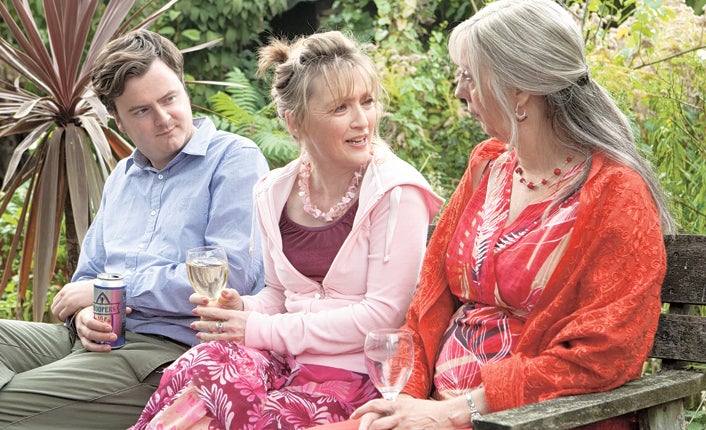Another Year (12A)
Starring: Jim Broadbent, Ruth Sheen, Lesley Manville, David Bradley

After the outbreak of cheeriness that was Mike Leigh's last film, Happy-Go-Lucky (2008), his latest reverts to the low spirits and bleak moments we usually associate with his not-quite-comedies of manners. The opening scene of Another Year involves a distracted, unsmiling woman, played by Imelda Staunton, tersely fencing off a medical counsellor who's been trying to get to the bottom of her insomnia. "On a scale of one to 10 how happy would you say you are?" The patient briefly considers: "One."
The film takes its theme, if not its mood, from that exchange. It is essentially about depression, specifically late-middle-age depression, though its two most central characters are a long- and happily-married couple. They would be Gerri (Ruth Sheen), the aforementioned counsellor, and her engineer husband, Tom (Jim Broadbent), whose easygoing relationship revolves around their garden allotment in north London. These two have discovered in each other a deep contentment, the sort which seems mysterious to the likes of Gerri's colleague Mary (Lesley Manville), a nervy single woman who tries to keep her unhappiness in check by talking a great deal. She battens on Gerri and Tom in a slightly parasitic way (she wants to know their secret), and has a hopeless, unspoken crush on their 30-year-old son Joe (Oliver Maltman). "She's almost like an aunt to Joe," says Gerri, fondly. "I wouldn't say that," Mary squawks, horrified.
Leigh structures the film around the four seasons of the year, which end up as four slices of life rather than an organic whole. His famous intensive methods of rehearsal and improvisation allow characters room to develop at the expense of telling much of a story. Scenes tend to go on for too long and throw one's concentration; more than ever before I found myself admiring the acting while questioning the authenticity of what's actually happening. With Ruth Sheen and Jim Broadbent that technique is fine. They are so relaxed in their kind-hearted geniality as to be almost telepathic, like two fluent jazz-players riffing off each other. You feel you might know these people, and like them. The problem role here is the grandstanding dynamic one that so often features in a Mike Leigh film – think David Thewlis in Naked, Brenda Blethyn in Secrets and Lies, and to a certain extent even Sally Hawkins in Happy-Go-Lucky.
This time it's Lesley Manville as Mary, who maintains such a sharp note of neediness that she almost impales herself on it. As garrulous as Miss Bates, as terrified of ageing as Blanche DuBois, Mary twitches away unstoppably, her self-pity inflamed by the accelerant of white wine. Now and then the camera silently pauses on her face, and Manville lets us see every contour of fear and loneliness etched upon it. But soon she's spouting off again, about her exes, her misadventures, her malfunctioning car. It's too much, and the strain tells in the script. I have never heard three people talking together who repeatedly address one another by name ("Is that right, Mary" "Yes, Tom", etc). This (I would guess) is a result of Leigh's overcontrolling his actors, whereby their determination to act like "real people" crosses over into self-parody.
The film presents Mary with a matching character, Ken (Peter Wight), Tom's old friend from school who comes down to stay with him and Gerri every year. Ken works in a government employment office in Hull. (This may or may not be a wink to Philip Larkin: the film partakes of the poet's gloom, though not of his verbal concision and elegance). Like Mary, he's lonely and relies too much on booze – "Less Thinking, More Drinking" reads the sad slogan on his T-shirt. Ken is rather sweet on Mary, but she's brusque and impatient with him. Will she melt? It doesn't matter: this potential storyline is left for dead when Ken disappears from the picture, never to return. Which makes you wonder why Leigh bothered to introduce him to us in the first place. Character in this setting is like a variety act that comes on stage, does a turn, then clears off – just as Imelda Staunton does after her one scene.
It happens again in the last section, "Winter", when Tom asks his widowed brother Ronnie to stay with them in London for a few days. David Bradley, who plays him, does as fine a job as Peter Wight in suggesting a certain middle-aged depressive who's lost his way in the world. Ronnie's affliction isn't drink but a chronic inability to connect with people, evidenced in the monosyllabic miserliness of his chat. When Mary calls at the house she finds Ronnie there alone, and we watch another Leigh masterclass in social awkwardness played out, a duet between someone who doesn't know how to start a conversation and someone who doesn't know how to stop. But this too has no link to anything thereafter, the focus switching instead to some unexplained misdemeanour on Mary's part that alienated Gerri between autumn and winter.
Fans and defenders will say that what Leigh shows us is real life, "another year" that trundles along in its eventless, humdrum way, sometimes light and jolly, more often sorrowful and wretched. But do we really go to the cinema for a facsimile of real life? Surely it is not mere accuracy we want from movies, but dramatic propulsion, shape and meaning, even transcendence. Art is the stuff that makes "real life" tellable, and thus, in a small way, survivable. Another Year offers what nearly every Mike Leigh film does, a handful of funny lines and acting out of the top-drawer. It will probably win many awards. But it's far from great.
Join our commenting forum
Join thought-provoking conversations, follow other Independent readers and see their replies
Comments
Bookmark popover
Removed from bookmarks